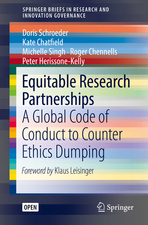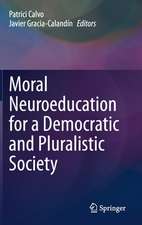The Ethics of Cybersecurity: The International Library of Ethics, Law and Technology, cartea 21
Editat de Markus Christen, Bert Gordijn, Michele Loien Limba Engleză Hardback – 11 feb 2020
| Toate formatele și edițiile | Preț | Express |
|---|---|---|
| Paperback (1) | 579.24 lei 6-8 săpt. | |
| Springer International Publishing – 18 sep 2020 | 579.24 lei 6-8 săpt. | |
| Hardback (1) | 725.46 lei 6-8 săpt. | |
| Springer International Publishing – 11 feb 2020 | 725.46 lei 6-8 săpt. |
Din seria The International Library of Ethics, Law and Technology
- 15%
 Preț: 688.94 lei
Preț: 688.94 lei - 20%
 Preț: 966.26 lei
Preț: 966.26 lei - 15%
 Preț: 632.01 lei
Preț: 632.01 lei - 15%
 Preț: 632.81 lei
Preț: 632.81 lei - 18%
 Preț: 769.85 lei
Preț: 769.85 lei -
 Preț: 374.37 lei
Preț: 374.37 lei - 15%
 Preț: 636.83 lei
Preț: 636.83 lei -
 Preț: 374.76 lei
Preț: 374.76 lei -
 Preț: 388.86 lei
Preț: 388.86 lei - 15%
 Preț: 576.37 lei
Preț: 576.37 lei - 15%
 Preț: 573.46 lei
Preț: 573.46 lei - 5%
 Preț: 1080.30 lei
Preț: 1080.30 lei - 15%
 Preț: 571.55 lei
Preț: 571.55 lei - 15%
 Preț: 579.24 lei
Preț: 579.24 lei - 15%
 Preț: 681.90 lei
Preț: 681.90 lei - 18%
 Preț: 713.21 lei
Preț: 713.21 lei - 15%
 Preț: 631.86 lei
Preț: 631.86 lei - 15%
 Preț: 629.60 lei
Preț: 629.60 lei -
 Preț: 288.27 lei
Preț: 288.27 lei - 24%
 Preț: 644.82 lei
Preț: 644.82 lei - 18%
 Preț: 724.52 lei
Preț: 724.52 lei - 15%
 Preț: 629.60 lei
Preț: 629.60 lei - 15%
 Preț: 625.41 lei
Preț: 625.41 lei - 15%
 Preț: 627.51 lei
Preț: 627.51 lei - 5%
 Preț: 701.16 lei
Preț: 701.16 lei - 15%
 Preț: 627.04 lei
Preț: 627.04 lei
Preț: 725.46 lei
Preț vechi: 884.70 lei
-18% Nou
Puncte Express: 1088
Preț estimativ în valută:
138.84€ • 144.64$ • 115.44£
138.84€ • 144.64$ • 115.44£
Carte tipărită la comandă
Livrare economică 10-24 februarie 25
Preluare comenzi: 021 569.72.76
Specificații
ISBN-13: 9783030290528
ISBN-10: 3030290522
Ilustrații: XVII, 384 p. 19 illus.
Dimensiuni: 155 x 235 mm
Greutate: 0.74 kg
Ediția:1st ed. 2020
Editura: Springer International Publishing
Colecția Springer
Seria The International Library of Ethics, Law and Technology
Locul publicării:Cham, Switzerland
ISBN-10: 3030290522
Ilustrații: XVII, 384 p. 19 illus.
Dimensiuni: 155 x 235 mm
Greutate: 0.74 kg
Ediția:1st ed. 2020
Editura: Springer International Publishing
Colecția Springer
Seria The International Library of Ethics, Law and Technology
Locul publicării:Cham, Switzerland
Cuprins
Chapter 1. Introduction.- Part 1. Foundations.- Chapter 2. Basic Concepts and Models of Cybersecurity (Endre Bangerter).- Chapter 3. Core values in Cybersecurity (Ibo van de Poel).- Chapter 4. Ethical Frameworks for Cybersecurity (Mary Manjikian).- Chapter 5. Legislative Framework for Cybersecurity (Gloria Gonzalez Fuster, Lina Jasmontaite).- Part 2 – Problems .- Chapter 6. Cybersecurity in Health (Karsten Weber, Nadine Kleine).- Chapter 7. Cybersecurity in Business (Gwenyth Morgan, Bert Gordijn).- Chapter 8. Cybersecurity of Critical Infrastructures (Emad Yaghmaei, TU Delft, Michele Loi).- Chapter 9. Cybersecurity and Cyberwar (Mariarosario Taddeo).- Chapter 10. Cybersecurity and the State (Harald Zwingelberg, Eva Schlehahn).- Chapter 11. Cybersecurity and Democracy.- Chapter 12. Ethical and Unethical Hacking (David-Olivier Jaquet-Chiffelle).- Chapter 13. Ethical Dilemmas for Cybersecurity Service Providers.- Chapter 14. Cybersecurity and the Individual.- Part 3 – Solutions.- Chapter15. Requirements on the Policy Level to Ensure Cyberpeace.- Chapter 16. Policies for Data Sharing and Data Protection for Security Software Providers (Alexey Kirichenko).- Chapter 17. A framework for Ethical Cyber-Defence for Companies.- Chapter 18. Privacy-Protecting Cybersecurity Technologies (Josep Domingo-Ferrer).- Chapter 19. Guidelines for Medical Professionals to Ensure Cybersecurity in Digital Healthcare.- Chapter 20. Conclusion.
Recenzii
“This volume provides a valuable overview of the issues and dilemmas in the field of cybersecurity ethics, particularly in the European context. The volume will be of interest to graduate students and academic researchers, and some of the essays will also be useful to undergraduates.” (Mary Manjikian, Prometheus, Vol. 36 (4), December, 2020)
Notă biografică
Markus Christen is a Research Group Leader at the Institute of Biomedical Ethics and History of Medicine and Managing Director of the UZH Digital Society Initiative. He received is MSc in philosophy, physics, mathematics and biology at the University of Berne and his PhD in neuroinformatics at the Federal Institute of Technology in Zurich. He was predoctoral fellow at the Max-Planck Institute of the History of Science in Berlin, postdoctoral researcher at the Graduate Program of Interdisciplinary Ethics Research of the University Research Priority Program Ethics of the University of Zurich, fellow of the NEH Institute for Advanced Topics in the Digital Humanities, University of Charlotte (NC, USA), Visiting Scholar at the Psychology Department of the University of Notre Dame (IN, USA) and he ismember of the Human Brain Project’s Ethics Advisory Board and the Swiss governmental expertise group on the future of data security. His research interests are in empirical ethics, neuroethics, ICT ethics and data analysis methodologies. He has published more than 100 contributions in various fields, authored or co-edited 10 books, raised 25 grants from various institutions (among others: Horizon 2020, Swiss National Science Foundation, Swiss Commission of Technology and Innovation), and he has co-organised 23 conferences.
Bert Gordijn is Professor and Director of the Institute of Ethics at Dublin City University in Ireland. He has studied Philosophy and History in Utrecht, Strasbourg and Freiburg in Breisgau. In 1995 he was awarded a doctorate in Philosophy from the Albert-Ludwigs-Universität Freiburg, followed by a doctorate in Bioethics from the Radboud University Nijmegen in 2003. Bert has been a Visiting Professor at Lancaster University (UK), Georgetown University (USA), the National University of Singapore, the Fondation Brocher (Switzerland), and Yenepoya University (Mangalore, Karnataka, India). He has served on Advisory Panels and Expert Committeesof the European Chemical Industry Council, the European Patent Organisation, the Irish Department of Health and UNESCO. Bert is Editor-in-Chief of two book series: “The International Library of Ethics, Law and Technology” and “Advances in Global Bioethics” as well as a peer reviewed journal: “Medicine, Health Care and Philosophy”, all published by Springer. He is Secretary of the European Society for Philosophy of Medicine and Healthcare and President of the International Association of Education in Ethics.
Michele Loi is postdoctoral researcher at the Institute of Biomedical Ethics and History of Medicine. He received a Bachelor and Master in Philosophy and a Doc-torate in Political Theory. He was doctoral fellow at LUISS Guido Carli in Rome, post-doctoral fellow at the University San Raffaele and San Raffaele Scientific Institute in Milan, Universidade do Minho in Braga (Portugal) and at the ETH Zurich and Visiting Fellow at the Fundation Brocher (Switzerland) and at the Hoover Chair of Political Philosophy (Belgium) and consultant for the World Health Organization. He co-wrote and co-launched the COST Action CHIP ME on genetic data. His research interests are social justice (including data justice and health justice) and the ethical and social impact of technology.
Textul de pe ultima copertă
This open access book provides the first comprehensive collection of papers that provide an integrative view on cybersecurity. It discusses theories, problems and solutions on the relevant ethical issues involved. This work is sorely needed in a world where cybersecurity has become indispensable to protect trust and confidence in the digital infrastructure whilst respecting fundamental values like equality, fairness, freedom, or privacy. The book has a strong practical focus as it includes case studies outlining ethical issues in cybersecurity and presenting guidelines and other measures to tackle those issues. It is thus not only relevant for academics but also for practitioners in cybersecurity such as providers of security software, governmental CERTs or Chief Security Officers in companies.
Caracteristici
First systematic overview of ethics of cybersecurity including case studies Provides a combined focus on structural, systemic traits and topical debates Contains rich case studies on practical ethical problems of cybersecurity






















